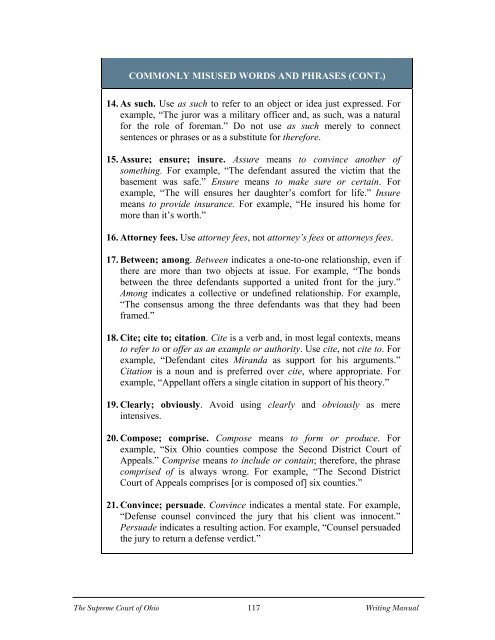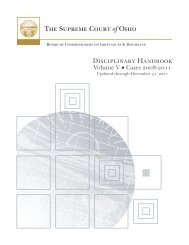WRITING MANUAL - Supreme Court - State of Ohio
WRITING MANUAL - Supreme Court - State of Ohio
WRITING MANUAL - Supreme Court - State of Ohio
Create successful ePaper yourself
Turn your PDF publications into a flip-book with our unique Google optimized e-Paper software.
COMMONLY MISUSED WORDS AND PHRASES (CONT.)<br />
14. As such. Use as such to refer to an object or idea just expressed. For<br />
example, “The juror was a military <strong>of</strong>ficer and, as such, was a natural<br />
for the role <strong>of</strong> foreman.” Do not use as such merely to connect<br />
sentences or phrases or as a substitute for therefore.<br />
15. Assure; ensure; insure. Assure means to convince another <strong>of</strong><br />
something. For example, “The defendant assured the victim that the<br />
basement was safe.” Ensure means to make sure or certain. For<br />
example, “The will ensures her daughter’s comfort for life.” Insure<br />
means to provide insurance. For example, “He insured his home for<br />
more than it’s worth.”<br />
16. Attorney fees. Use attorney fees, not attorney’s fees or attorneys fees.<br />
17. Between; among. Between indicates a one-to-one relationship, even if<br />
there are more than two objects at issue. For example, “The bonds<br />
between the three defendants supported a united front for the jury.”<br />
Among indicates a collective or undefined relationship. For example,<br />
“The consensus among the three defendants was that they had been<br />
framed.”<br />
18. Cite; cite to; citation. Cite is a verb and, in most legal contexts, means<br />
to refer to or <strong>of</strong>fer as an example or authority. Use cite, not cite to. For<br />
example, “Defendant cites Miranda as support for his arguments.”<br />
Citation is a noun and is preferred over cite, where appropriate. For<br />
example, “Appellant <strong>of</strong>fers a single citation in support <strong>of</strong> his theory.”<br />
19. Clearly; obviously. Avoid using clearly and obviously as mere<br />
intensives.<br />
20. Compose; comprise. Compose means to form or produce. For<br />
example, “Six <strong>Ohio</strong> counties compose the Second District <strong>Court</strong> <strong>of</strong><br />
Appeals.” Comprise means to include or contain; therefore, the phrase<br />
comprised <strong>of</strong> is always wrong. For example, “The Second District<br />
<strong>Court</strong> <strong>of</strong> Appeals comprises [or is composed <strong>of</strong>] six counties.”<br />
21. Convince; persuade. Convince indicates a mental state. For example,<br />
“Defense counsel convinced the jury that his client was innocent.”<br />
Persuade indicates a resulting action. For example, “Counsel persuaded<br />
the jury to return a defense verdict.”<br />
The <strong>Supreme</strong> <strong>Court</strong> <strong>of</strong> <strong>Ohio</strong> 117 Writing Manual
















